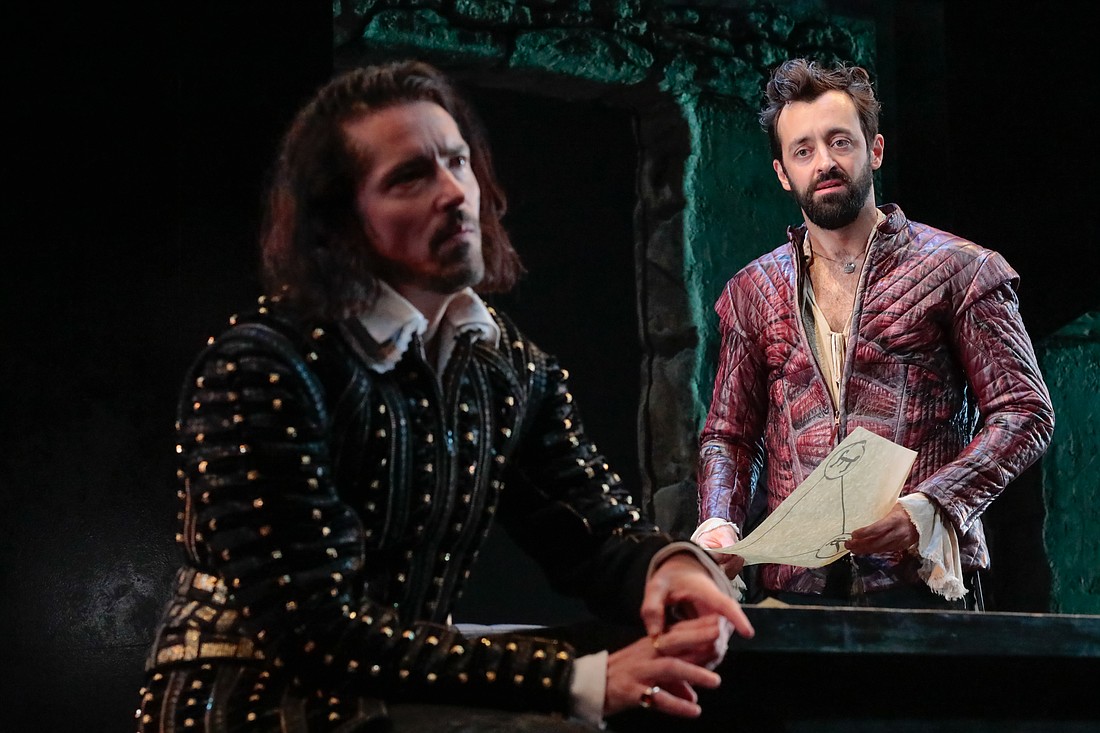- May 9, 2025
-
-
Loading

Loading

Elizabethan England was a time of white-hot theatrical creativity. It was a time of paranoia and repression. It was the best of times and the worst of times. Liz Duffy Adams’ “Born with Teeth” captures both sides on the Asolo Rep stage.
Her play revolves around the three-year collaboration of Christopher “Kit” Marlowe (Matthew Amendt) and William Shakespeare (Dylan Godwin) on the Henry VI history plays. (Sounds far-fetched, but scholars have proved they worked together on this trilogy.)
The authorial action unfolds in a shabby rented room behind a tavern. The action itself is pointed. While there’s no actual sword fight, the playwrights’ war of words draws blood. That’s not just a metaphor; England in the late 1500s was basically a police state. The wrong word (or thought) could get you killed. To make matters worse, an informer who points out a colleague’s heresy could get handsomely paid.
While this dynamic duo is supposedly working on the Henry VI trilogy, most of the actual script-work happens in the first scene. After that, the bulk of the dialogue is verbal sparring with no connection to the plays. Shakespeare’s clearly outclassed, at least at first. He’s new to the playwriting game and still an unknown.
But Marlowe’s a superstar, thanks to blood-and-thunder hits like “Tamburlaine the Great” and “Doctor Faustus.” But playwriting’s just his sideline. Marlowe pays for his fancy clothes with scraps of intelligence sold to Queen Elizabeth’s secret police and three powerful patrons who despise each other. There’s a lot to juggle, and he could use a little help. During the script sessions, he’s constantly trying to recruit the budding Bard into his spy ring.
When Shakespeare says no, Marlowe badgers him, looking for weak points, trying to trip him up and expose his secrets. Shakespeare’s suspected of being a secret Catholic. (He isn’t, although his family is.) No matter. In this dystopian Londontown, suspicion is proof.
Guilty or not, Marlowe will profit if he sells Shakespeare out — but he’s willing to cut the kid a break. If Shakespeare informs on another playwright, he might save his own skin. The shy-but-moral country boy still declines. But the charismatic Marlowe has another recruitment incentive: Same-sex flirtation.
Rob Melrose's direction packs a rope-a-dope punch. He brings out the play’s life-or-death dialectic. The two characters spar with machine-gun-fire wit. (Sticks and stones can break your bones, but words can really hurt you.) Melrose keeps a tight focus on what’s at stake and where the argument’s going.
The play’s two characters are yin and yang, fire and ice, water and magnesium. Not a perfect balance. A perfectly unstable blend of opposites. Godwin’s Shakespeare is a taciturn country boy. He tries to stay in the background and keep his head down. In contrast, Amendt’s Marlowe is the cock of-the-walk. He’s a superstar talent and his own biggest fan. The actors deliver two brilliant characterizations. Neither is what you’d expect.
“Born with Teeth” defies expectations whenever it can.
No lutes, no pantaloons, no olde-tyme preciousness. Sound designer Cliff Caruthers frames this production with an electronic techno beat straight out of a rave. Alejo Vietti’s costumes make Marlowe look like a rock god and Shakespeare like a rube.
Michael Locher’s set is the opposite of glamorous. It’s low-rent and shabby — very film noir. (If they had neon back then there’d be a flickering sign outside the pub.) Carolina Ortiz Herrera’s expressionistic lighting contributes to the mordant mood. The show’s creative world builders consistently take the road less traveled. And what sort of a world is it at all?
To paraphrase the playwright, it’s no renaissance fair.
The realm of Adams’ “Born with Teeth” is the Elizabethan equivalent of Terry Gilliam’s film “Brazil.” Her late-15th-century Great Britain is a place of surveillance, spies, torture and cash-on-the-nail betrayals. It’s a paranoid world. You may think you’re being watched and people are plotting against you. You’re not crazy, you’re right. Get it?
When it’s not dark and disturbing, “Born with Teeth” is laugh-out-loud funny. Gallows humor of the finest kind. There’s plenty of English-major fan service and name-drops of the usual suspects. (Lord Essex, the School of Night, Greene’s “upstart crow” insult to the Bard, etc.) But you don’t have to be an English major to dig it. You will. But don’t mistake it for a documentary.
Adams’ sharply written play is rooted in historic fact, but it’s a work of fiction. There’s a twist ending. (I didn’t see it coming. I usually do.) Don’t try to suss it out, because it’s not the play’s point.
The point is the cost of surviving as an artist in a totalitarian state. The price is steep. Nothing less than your real self.
To keep working as an artist in these harsh realms, you can’t be authentic. To thine own self you can’t be true. Like Iago, your creed should be, “I am not what I am.” Like MacBeth, your false face should hide what your false heart doth know.
That’s the price.